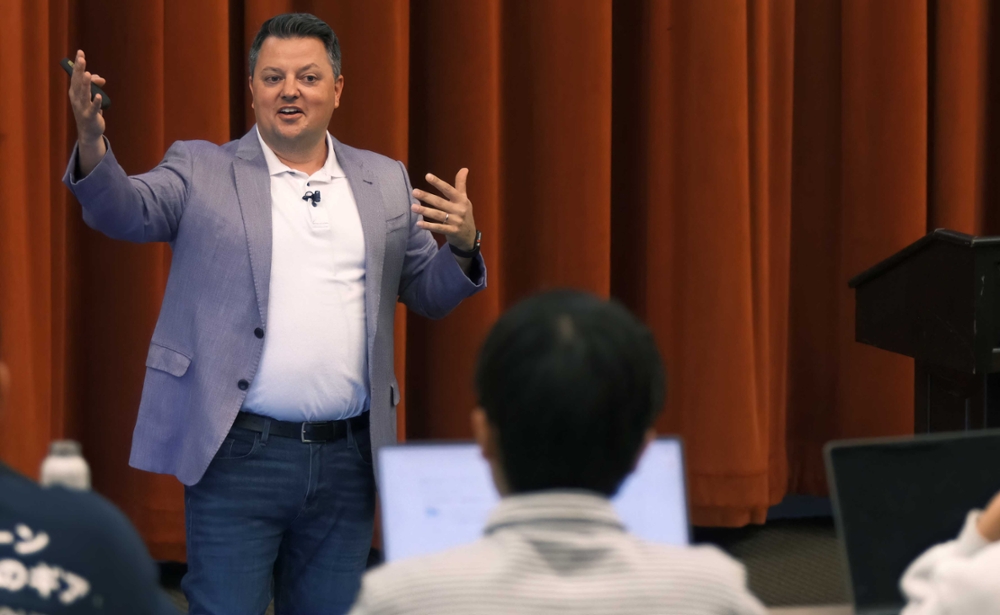Farmer School alum touts power of connection in life, business
If you are alone, are you feeling lonely, or are you enjoying solitude?

Farmer School alum touts power of connection in life, business
When someone feels like they belong at their job, when they feel like they’re part of a team, it has effects that may sound way out of proportion to an outsider, author and Farmer School alum Ryan Jenkins said.
“Sixty-seven percent of employees are more likely to recommend their employer when they feel a strong sense of belonging, performance goes up 56 percent, and engagement increases 75 percent. We see a reduction in employee sick days,” he said. “When individuals have a strong sense of belonging and connection at work, they have 313% less intent to quit.”
The problem is, Jenkins said, a majority of workers say they don’t have that connection and belonging. “Seventy-two percent of global workers feel lonely at least monthly, with 55 percent saying at least weekly. Sixty-nine percent of employees aren't satisfied with the opportunities for connection currently in their workplace. Seventy-nine percent of Gen Z reports sometimes or always feeling lonely. And three out of five employees say their leaders aren't doing a good job promoting or discussing connection,” Jenkins said. “I found that so alarming that I wanted to figure out why this was happening, what we could do to help as that generation began pouring into the workforce.”
Jenkins spent more than three years examining studies, surveying workers, and interviewing business leaders before publishing his co-authored book “Connectable: How Leaders Can Move Teams From Isolated to All In” earlier this year. He’s working with companies and organizations to help them foster greater connections and a better sense of belonging among their employees, as well as help employees deal with loneliness and disconnection themselves.
“Belonging and connection can unlock your fullest potential while improving well-being, retention, engagement, inclusion, and performance,” Jenkins told students at his Executive Speaker Series talk.
He noted that a research study found that when asking people to estimate the degree of steepness of a hill they would climb, simply adding a partner made the person’s estimate decrease by 30 percent. “When we're together, when we have a connection with someone else, or we're going to tackle an obstacle with just one other person, we perceive that obstacle to be less threatening,” Jenkins said.
Jenkins talked about a four-step process for dealing with loneliness:
- Identify loneliness in yourself and in others
- Improve the strength of work relationships
- Create a focus on what is important at work
- Accentuate what is working to sustain progress
He said that it doesn’t take a lot of effort to make small but additive changes to our behaviors, ranging from asking coworkers “How’s your day going?” instead of just saying “Good morning,” to talking with strangers on subways, at airports, or in waiting rooms. “Connecting with others, even strangers, makes us feel good, whether we're the initiator or the receiver. Even if you were introverted or extroverted, connection is what makes us feel the best,” Jenkins said.
When Farmer School dean Jenny Darroch asked him about loneliness and remote work, Jenkins said that it’s important to define loneliness correctly. “It's not the absence of people, it's the absence of connection. You could be in a crowded room like this, but if you don't have connections with people, you can still feel very detached and isolated,” he said. “Conversely, you could be working remotely but have a very strong connection to your team members, your team lead, your manager, the work itself, and not experience the levels of loneliness that that person in that crowded room does. So it's not predicated necessarily on presence. That's why we can develop stronger connections in a digital format. It's a lot harder and it takes a lot more intentionality. But it can definitely be done.”
“Loneliness is a universal human condition. And at the end of the day, you and I are stronger together, we're healthier together, and ultimately, you and I, we belong together,” Jenkins concluded.